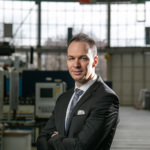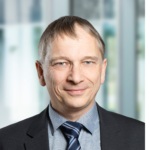Special Interest Conference: Advancing in Additive Manufacturing Workshops 2025
Workshop: Dedicated Machine Tools for Precision Additive Manufacturing
Monday 6th October 2025
Venue: TU Berlin
Time: 16:00-17:30
The tutor is Professor Dr.-Ing. Julian Polte, TU Berlin.
Julian Polte is a Professor at Technische Universität Berlin, where he holds the Chair of Machine Tools and Technologies for Additive Manufacturing of Precise Metallic Components. He is also Head of the Production Systems Division at the Fraunhofer Institute for Production Systems and Design Technology (IPK) in Berlin. His research is dedicated to advancing machine tools and production systems designed for high-precision manufacturing.

This workshop focuses on the development and applications of machine tools specifically for precision additive manufacturing (AM) of metallic components. As the demand for complex, high-performance parts increases across industries such as aerospace, medical devices and tool manufacturing, there is a growing need for AM systems that can deliver tight tolerances, excellent surface quality and minimal post-processing. The session will explore how machine tool architecture, process integration and advanced control strategies can be optimized to meet these stringent requirements.
Intended audience: This workshop is aimed at professionals and academics working in advanced manufacturing who are interested in the design and optimization of systems for high-precision metal additive manufacturing.
Learning outcomes: By the end of the workshop, participants will have an understanding of how machine tools can be engineered to meet the demanding requirements of precision additive manufacturing. They will gain practical insights into the interplay between machine design, process control and post-processing, as well as learn about strategies to improve dimensional accuracy, surface integrity and process stability. Attendees will also learn about recent advancements in hybrid systems that combine additive and subtractive processes within a single platform, providing new pathways for efficient, high-quality production.
Workshop: Characterization of advanced materials by traceable X-ray spectrometry
Monday 6th October 2025
Venue: TU Berlin
Time: 14:00-15:30
The tutor is Dr Burkhard Beckhoff
Dr Burkhard Beckhoff is head of the X-ray spectrometry working group at PTB, Germany’s national metrology institute. He studied physics in Germany and France. After his PhD in physics, he joined the PTB department of metrology with synchrotron radiation where he developed various research activities in the field of surface and interface characterisation of nanoscale samples from nanoelectronics, biotechnology, energy conversion and storage. He was involved in the acquisition of more than 20 European (FP6, Horizon, EMPIR, EPM) and 10 German (DFG, BMBF, MNPQ, WIPANO) research projects, several of which he coordinated. He was initiator and co-organiser of the ALTECH symposia on techniques for the characterisation of nanomaterials at the E-MRS Spring Conference 2014 to 2024, co-editor of the Springer handbook “Handbook of Practical X-ray Fluorescence Analysis” and co-organiser of the international roadmap generation of the “International Initiative on X-Ray Fundamental Parameters” (www.exsa.hu/fpi.php). Since 2000, he has been co-organiser of the research seminar “Modern Analytical Methods in Physics” at the Technical University of Berlin (TUB). In 2018 he received the “outstanding career award” of the European X-ray Spectrometry Association (EXSA). Since 2022 he is chairman of the standardisation committee ISO/TC 201 (Surface Chemical Analysis) SG2 (Energy materials).

This workshop focuses on the development and applications of x-ray spectrometry methods for the analytical characterization of advanced materials. The development of and the assessment of new materials require the correlation of the materials’ functionality with their underlying chemical and physical properties. The establishment of such a correlation strongly depends on the quantitative reliability, detection sensitivity and discrimination capability of the characterisation techniques employed. The session will explore how modern x-ray spectrometry including reference-material-free approaches can be optimized to meet these stringent requirements for various types of advanced materials.
Intended audience: This workshop is aimed at professionals and academics working in advanced manufacturing and related fields who are interested in the quantitative employment and optimization of analytical characterization techniques for advanced material development, manufacturing and quality control.
Learning outcomes: By the end of the workshop, participants will have an understanding of how x-ray analytical methods can be optimized to meet the demanding requirements of reliable characterizations of advanced materials. They will gain practical insights into the interplay between instrumental and experimental arrangements, quantification approaches including calibration and validation, as well as learn about strategies to improve analytical key parameters for specific applications. Attendees will also learn about recent advancements in hybrid x-ray spectrometric methodologies employed to characterize nanostructures, nano- and energy materials as well as interfaces, providing new pathways for the efficient correlation of the materials’ functionality with the related chemical and physical properties.
- Beckhoff B., Nanomaterials 2022, 12, 2255. https://doi:10.3390/nano12132255
- Beckhoff, B., Kanngießer, B., Langhoff, N., Wedell, R. and Wolff, H. (Editors), Handbook of Practical X-Ray Fluorescence Analysis, Springer-Verlag Berlin Heidelberg, 2006. https://doi.org/10.1007/978-3-540-36722-2

